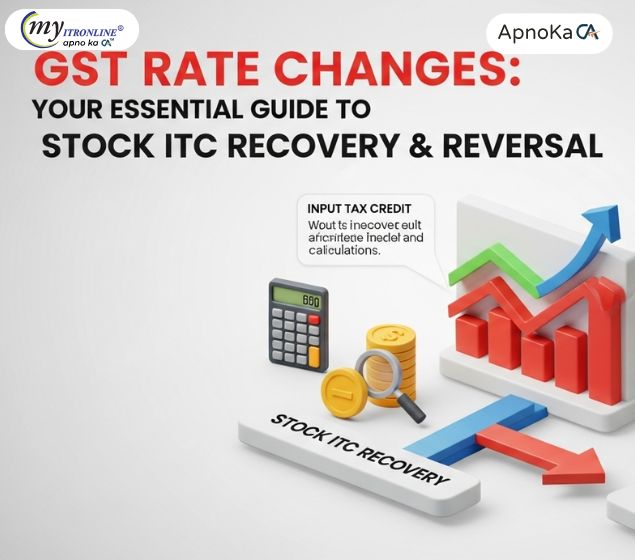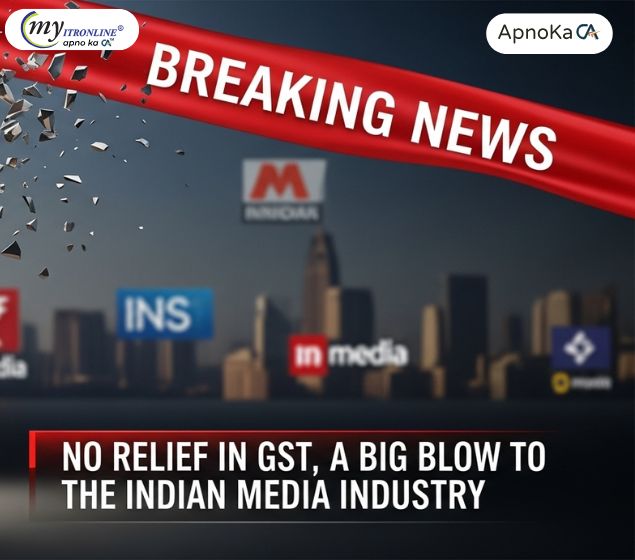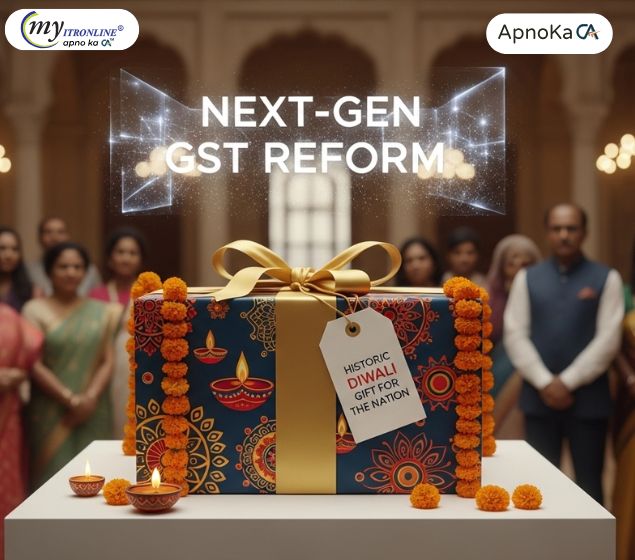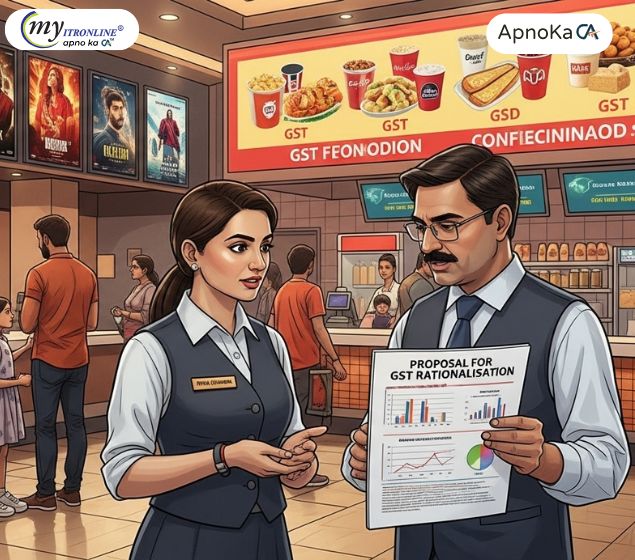# tin
12 posts in `tin` tag

GST Rate Changes: Your Essential Guide to Stock ITC Recovery & Reversal
This blog post provides a comprehensive guide to the upcoming GST rate changes in India, effective 22 September 2025, focusing specifically on the implications for Input Tax Credit (ITC) on stock. It explains the new simplified tax slab structure (5%, 18%, 40% for luxury goods) and details how businesses should handle ITC for stock purchased before the changes, supplies made after the changes, and unsold old inventory. The post offers practical advice on identifying stock, claiming eligible ITC, reversing ITC where necessary, seeking manufacturer support, and maintaining audit-ready records to navigate this significant tax transition effectively.

Breaking: No Relief in GST, A Big Blow to the Indian Media Industry
This blog post analyzes the impact of the latest GST reforms on the Indian media industry. It highlights how, despite appeals from media and advertising groups, the sector received no significant relief regarding tax parity for digital publications, input tax credit access, or flexible tax payment timing. The article details the approved reforms that benefited other sectors and consumers, contrasting them with the ignored pleas of the media, leading to concerns about worsening the digital divide, liquidity pressure, and hindered cost recovery. It concludes that the lack of targeted reforms poses a major setback for innovation, job creation, and overall growth in the Indian media landscape.

Historic Diwali Gift for the Nation: Next-Gen GST Reform
This blog details the significant GST cuts introduced as a 'Diwali gift' for the nation. It highlights how these reforms aim to simplify the tax structure and ease financial burdens across various sectors including daily essentials, agriculture, healthcare, education, and certain electronic appliances and vehicles, ultimately fostering a self-reliant India. The article also touches upon process reforms and a positive message from the Prime Minister.

Indian Multiplexes Urge Government for GST Rationalisation on Tickets and F&B
Indian multiplex chains are lobbying the government for a reduction in GST on movie tickets and the allowance of input tax credit (ITC) on food and beverages. They argue these reforms are crucial for making cinema more affordable, boosting industry growth post-pandemic, and competing with OTT platforms. While the Multiplex Association of India proposes a new tiered GST structure, industry opinions vary on whether pricing or content quality is the ultimate driver for audience footfall.

States Push for Tough Steps to Stop Profiteering from GST Cuts
The GST Council is set to meet on September 3-4 to review GST 2.0 reforms. States want strict rules to prevent profiteering so that GST rate cuts actually benefit consumers. Key proposals include a temporary anti-profiteering law, consumer complaint platforms, and tighter monitoring of sensitive sectors. Businesses, however, warn about compliance costs and pricing disruptions.
.jpg)
A Gift That Keeps on Taxing? ITAT Delivers Key Ruling on Capital Gains Between Spouses
The Income Tax Appellate Tribunal (ITAT) has clarified that when an asset gifted to a spouse is sold, the resulting capital gains must be taxed in the hands of the gifting spouse, not the recipient. This blog breaks down the mandatory "clubbing of income" provision under Section 64(1)(iv) of the Income Tax Act, explaining its implications for taxpayers, the calculation of gains, and the importance of proper documentation.
.jpg)
Navigating the Crypto Tax Minefield: A Detailed Guide for India's FY 2025-26
This blog provides a comprehensive guide to the taxation of Virtual Digital Assets (VDAs) and cryptocurrencies in India for the Financial Year 2025-26. It details the prevailing rules, including the flat 30% tax on all profits, the stringent policy of no loss set-off or carry forward, and the mandatory 1% TDS on transactions. The article also covers the tax implications for gifts, airdrops, and staking, along with the mandatory ITR filing requirements, to help Indian investors and traders navigate the tax landscape and ensure full compliance.
.jpg)
Digital Assets & Tax: What's New for Indian Investors in FY 2025-26?
India's digital asset taxation is maturing. For FY 2025-26, the core 30% tax and 1% TDS on VDAs remain, but expect a wider definition of VDAs and mandatory reporting by exchanges. This blog details current rules and what enhanced compliance means for crypto and other new-age investors.
.jpg)
The Latest on Partner Remuneration: FY 2025-26 Tax Changes Explained
The FY 2025-26 brings crucial changes for partnership firms & LLPs regarding partner remuneration. This blog decodes the new, increased deduction limits under Section 40(b) and the mandatory TDS introduction via Section 194T on payments to partners. It covers who's a working partner, the role of the partnership deed, and essential compliance steps for firms.
.jpg)
Important Update for Cancelled Composition Taxpayers Regarding GSTR-3A Notices!
This blog post discusses a common issue for composition taxpayers whose GST registration was canceled before April 1, 2024, or who have already submitted GSTR-4 but received GSTR-3A notices. It explains that these notices result from a system error and can be ignored by the taxpayers affected, meaning no further action is needed. The post also provides guidance on how to raise complaints about other GST-related problems.
.jpg)
GSTR-3B Table 3.2: Your Essential Guide to the New Auto-Fill Rules
This blog post breaks down the recent GST Portal advisory about Table 3.2 of GSTR-3B. It explains that starting July 2025, details of inter-state supplies to unregistered persons, composition taxpayers, and UIN holders will be auto-filled and non-editable in GSTR-3B. This information will come directly from GSTR-1 or IFF. The advisory aims to cut down on mistakes and keep data consistent. The post also covers why this change is occurring, how to fix errors by amending GSTR-1/IFF or using GSTR-1A, and offers an action plan for taxpayers to ensure they report accurately and smoothly file their GST.
.jpg)
The Cost of Delaying TDS: Understanding Section 201(1A) Interest and Penalties
This blog post provides a comprehensive overview of Section 201(1A) of the Income Tax Act, 1961, focusing on the interest levied for delayed TDS deduction or payment. It explains the two distinct scenarios for interest calculation (1% for failure to deduct, 1.5% for failure to pay after deduction), clarifies the "month or part of a month" rule, and illustrates calculations with clear examples. Furthermore, it details the severe implications for defaulting deductors, including "assessee in default" status, disallowance of expenditure under Section 40(a)(ia), various penalties (271C, 271H), and potential prosecution. The post concludes with practical best practices to help deductors ensure timely compliance and avoid these costly repercussions.
